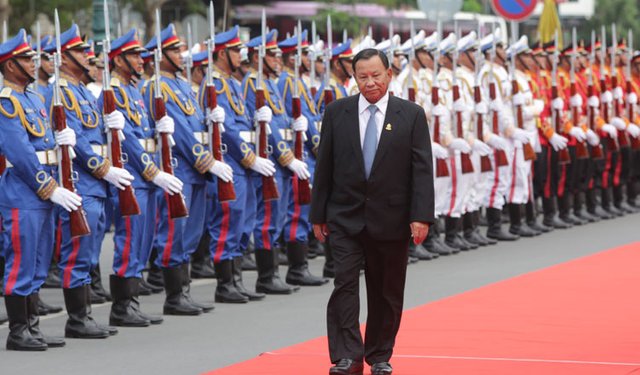State of Emergency draft signed into law

Acting Head of State Say Chhum yesterday signed the draft law on “State of Emergency” into legislation after the Constitutional Council of Cambodia unanimously approved it earlier this week, a decree obtained yesterday evening revealed.
Mr Chhum, who is also the Senate President, signed the law on behalf of King Norodom Sihamoni who departed the Kingdom early this month to undergo medical check-ups and treatment in the Chinese capital, Beijing.
Despite its ratification, some senior officials said it is unlikely for the “State of Emergency” law to be enforced as no new case of coronavirus case has been reported in 17 consecutive days.
The Health Ministry yesterday said the Kingdom has not reported any COVID-19 diagnosis since April 12, leaving only three out of the 122 patients under treatment in facilities in Banteay Meanchey, Kampong Cham and Preah Sihanouk provinces.
CPP spokesman and senator Sok Eysan said yesterday the law will take effect on the same day of its signing.
Asked if the Kingdom would declare a state of emergency now that the law has come into effect, Mr Eysan echoed Prime Minister Hun Sen who, in a previous press conference, said the likelihood of a state of emergency being declared amid the COVID-19 pandemic stands at “0.1 percent”. Nevertheless, the premier underlined the necessity of the law should the situation get out of control.
“The possibility of declaring a state of emergency is low as what Samdech Prime Minister said,” he said. “But if the situation changes, I believe we would declare it immediately.”
Mr Eysan added only the prime minister can request for the King to declare a state of emergency, with agreement from the presidents of the legislative bodies.
Likewise, Justice Ministry spokesman Chin Malin said recently a declaration may not be on the horizon since the COVID-19 is under control.
Kin Phea, director-general of the International Relations Institute at the Royal Academy of Cambodia, also noted the improvement of the coronavirus situation in the Kingdom.
“It does not mean we need to implement the [State of Emergency] law once it takes effect. Its enforcement depends on the situation,” said Mr Phea. A state of emergency, he noted, may only be declared if the nation is faced with a war, foreign invasion, public health emergencies spurred by pandemics and chaotic situations that threaten national security and public order.
“If we look at the COVID-19 situation in the Kingdom, we’ll note that the situation has become better; our people are paying more attention to the disease. No new cases have been reported in the past few days and we only have three patients who are being treated for the disease. So, there’s no reason to declare a state of emergency,” said Mr Phea.

Although some Asean member states have implemented their respective emergency law, Mr Phea said the Kingdom may not follow their path.
“If we maintain our management of the COVID-19, a declaration is unlikely to happen. However, if a second wave of infection resurges in the community, I believe the government may be compelled to consider putting the country in a state of emergency,” he added.
The law, which comes amid the global health crisis, consists of five chapters and 12 articles and is based on Article 22 new of the Constitution.
Article 5 of the emergency law stipulates the government may put in place mechanisms or delegate relevant authorities to use military forces in guaranteeing the enforcement of the law.
“In cases of war or any other circumstances in which national security is seriously jeopardised, management of the nation by the Royal Government may be implemented by a martial regime,” the article states.
Meanwhile, international NGO Human Rights Watch said in a statement yesterday that provisions of the “State of Emergency” Law raise several human rights concerns, including the possibility of indefinite renewals of a state of emergency and the wide scope of unfettered martial powers granted to the executive body without independent oversight.
“The state of emergency law will be a disaster for the human rights of the Cambodian people, who face having their civil and political rights stripped away,” said Phil Robertson, deputy Asia director at HRW.
In response, Mr Phea voiced disagreement, saying the wellbeing and lives of the people are more important than civil rights. He noted if the Kingdom is placed in a state of emergency, the people’s civil rights – such as the freedom of movement, public gatherings, reporting for work or even the freedom of the press – will be unavoidably curbed.
“It is not a disaster for human rights. However, in this situation, a state of emergency declaration would entail the protection of human rights because the right to life is more important,” he said. “Like it or not, when the country is placed in a state of emergency, the people’s civil rights will be withdrawn. We should prioritise the right to life.”